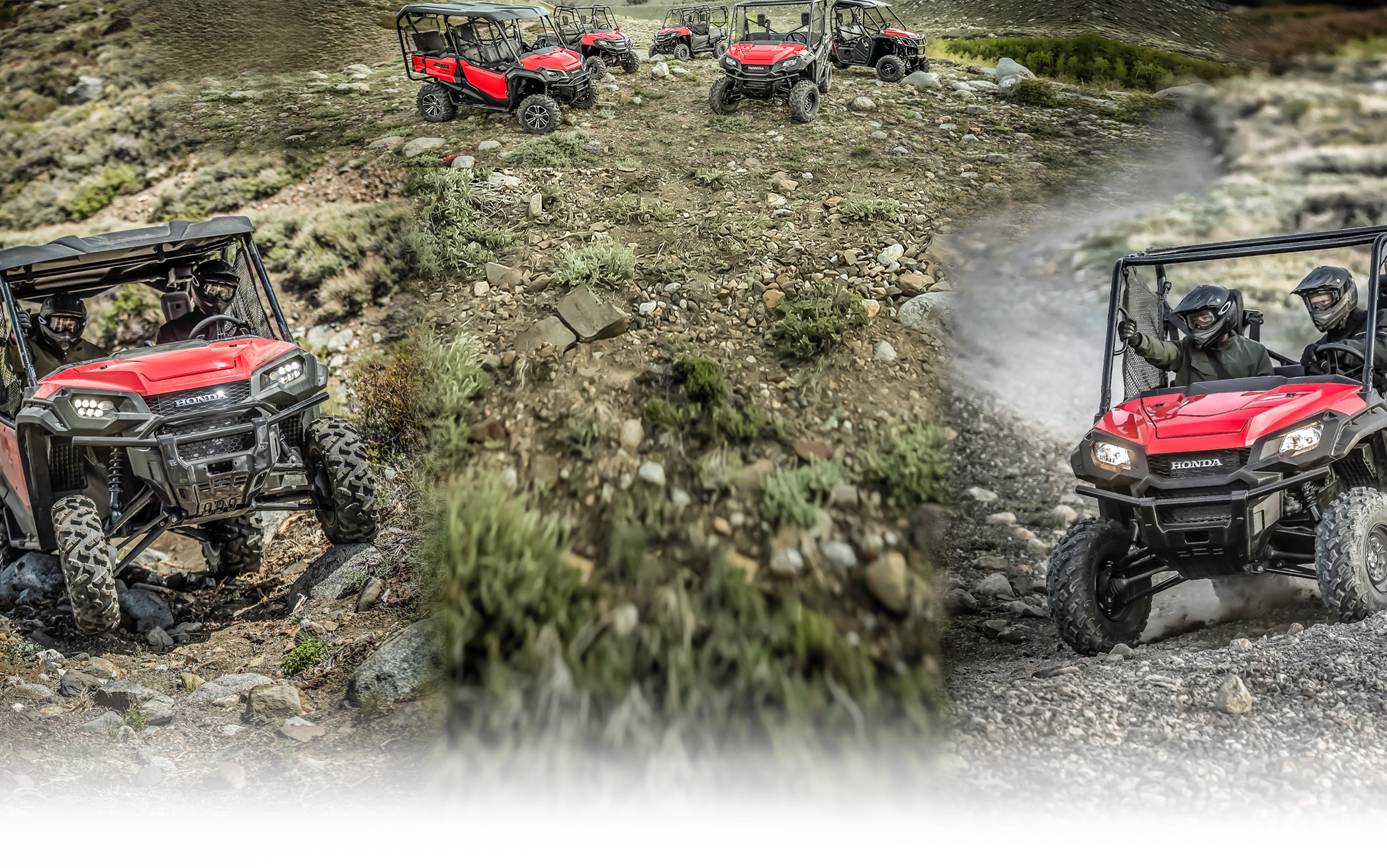HBarlow
Well-Known Member
Lifetime Member
This is a cut and paste from "Truck Camper Adventure", an excellent on-line magazine.
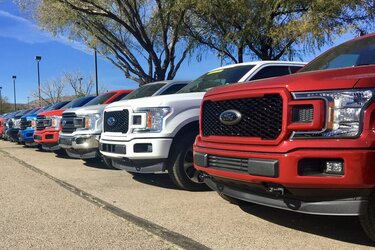
In 2017, we published our first article on this contentious topic called, “Gas vs Diesel for Truck Camper Rigs: Which is Better.” In that article we presented nine things to consider before buying a new truck. In this new article, Jeff Reynolds, ups to ante with a whopping 23 considerations. The results of his analysis, which was first presented at the recent Truck Camper Adventure Rally in Quartzsite, might surprise you.
The choice between either a gasoline or a diesel engine for a truck that carries a truck camper is a hot button issue. Young and old have dug in their heels to support their strongly held reasons for their choices. Engaging in research for this talk has been a real eye opener with a wide range of considerations, so I set about collecting as many worthy ones as I could find. If I offend anyone by leaving out their personal favorite truck it’s because I lack information. For that I apologize in advance.
I have always purchased horse power, torque, efficiency, longevity, brute strength, and low maintenance of the engine and drive train as the most important factors to do the job at hand using the engineer’s prime directive, “form follows function.” For use with a truck camper, I’ve come to believe a diesel engine was the ticket. But that belief over time has been shaken.
Over the past 20 years the 2001-2006 Dodge 5.9L 24-valve Cummins turbo diesel HO has proven to be one of the two undisputed winners in the early Diesel Wars. The other is the 1999 to early 2003 Ford 7.3L V-8 Power Stroke turbo diesel. My brother John has one. It is bulletproof. The technology of both of these is now getting long-in-the-tooth, but they’ll probably prattle on after many of us have taken our last off-ramp.
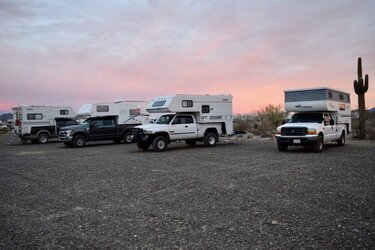 Undisputed winners in the early diesel wars: the author’s old 2001 Ram 2500 with the Cummins 5.9L (third from left) and his brother’s 1999 Ford F-250 with the Power Stroke 7.3L (far right). The author’s current truck, a Ford F-350 with the 7.3L Godzilla V-8 gasser, is shown second from the left.
Undisputed winners in the early diesel wars: the author’s old 2001 Ram 2500 with the Cummins 5.9L (third from left) and his brother’s 1999 Ford F-250 with the Power Stroke 7.3L (far right). The author’s current truck, a Ford F-350 with the 7.3L Godzilla V-8 gasser, is shown second from the left.
The start of the diesel wars around the year 2000 saw the emergence of a seemingly insatiable appetite by the truck-buying public for more power and more torque…. whether they needed it or not. It is addictive behavior. Once you drive a newer diesel it isn’t difficult to be seduced by the unimaginable power. You are not a “real man” unless you drive a diesel.
Thus began the diesel engine’s road to perdition. Unfortunately, the EPA and CARB had other ideas about internal combustion engines and thus began the slow inexorable tightening of the pollution control noose on diesel engines in order to cancel soot. To counter this trend, Ford and other car makers decided to develop add-ons and inject other potions to the engines to clear the air. While they did pass muster, the add-ons have proven not to have the life expectancy, low maintenance costs, and endurance of the legendary 5.9L Cummins or the equally legendary 7.3L Ford Power Stroke turbo diesel. But they do have impressively way more torque and horsepower.
Slightly later, GM unveiled their 6.5L Duramax turbo diesel V-8 mated to a sturdy Allison transmission, which put them at the front for a time, grabbing the baton in the changing fortunes of one-upsmanship during the diesel wars.
The final year that diesel truck engines were sold without major air pollution reducing add-ons was sometime during 2006 and 2007.
Early on, transmissions were the woe, with all that newly developed diesel engine torque raging war on transmissions simply too weak to withstand the torque load or have any longevity, especially with Fiat-Chrysler transmissions. Meanwhile, V-8 and V-10 gasoline engines were still in the running as a somewhat meager alternative to the massive torque of the diesels, but with considerably less torque and mileage. The gassers still had a large following for occasionally hauling a not-so-large or heavy truck camper.
I made a numbers comparison chart of the largest 2020 gas V-8’s and diesel engines of all three major truck manufacturers and believe I have stumbled onto one reason that gas V-8’s don’t stand up to heavy hauling. It’s the drop in torque that the smaller gas V-8’s exhibit. Only the Ford 7.3L and GM 6.6L gassers retain most of their torque down to the 1,500 rpm range. The published numbers are difficult to pin down as there are discrepancies in the literature of the “Big Three.” The difference may be due to different applications and air pollution rules.
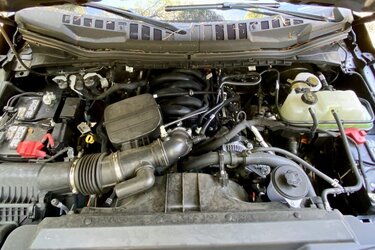 The Ford Godzilla 7.3L Gasoline V-8
The Ford Godzilla 7.3L Gasoline V-8
Ford’s 7.3L and GM’s 6.6L gas engines have an extra arrow in their quiver, namely a brand new 10-speed automatic transmission. Besides the lowest of low gears at 4.6 or 4.7 they have a perfect spread of gears right up to the three overdrive gears.The combination is simply a game changer. It puts a massive amount of torque to the drive wheels; just what you need when hauling or pulling a big load like a truck camper. Ford is so sure of this engine and transmission that they use it in applications up to F-750 trucks with up to a 37,000 pound GCVWR. Impressive.
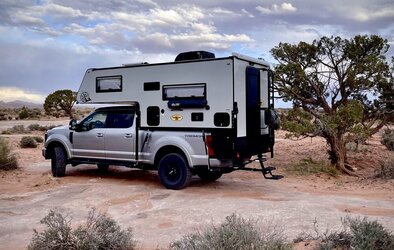 Bundutec Roadrunner with the Ford Tremor 7.3L Gasoline V-8. (Paul McPhillips)
Bundutec Roadrunner with the Ford Tremor 7.3L Gasoline V-8. (Paul McPhillips)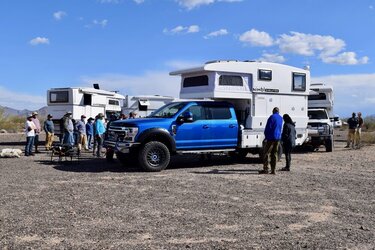 The new Nimbl Vehicle Evolution is powered by Ford’s new 7.3L gasoline V-8.
The new Nimbl Vehicle Evolution is powered by Ford’s new 7.3L gasoline V-8.
GM has upped the ante also with their own 10-speed automatic especially designed for use in trucks. The GM numbers look to be largely rounded off Ford numbers. I suspect they use the same or similar internals with each using their own case mold to fit GM or Ford protocols and bell housings. Here’s a comparison between the two:
Enter the newest addition to my two truck fleet: a 2020 Ford 4WD, F-350 SRW super cab, short-bed with the 7.3L gas V-8 and new 10-speed automatic.
My first instinct in looking around for another truck was to buy another diesel pickup. But the more I looked at the clabbed-on air pollution control devices on newer diesels, and the more I read about the owner complaints about newer diesels, the more I looked for other options. What complaints? Below is a compendium of Ford diesel fuel emissions systems woes reported by owners on the Ford Truck Enthusiasts (FTE) Forum website. Many of these same woes also pertain to owners of newer GM and Fiat-Chrysler diesel trucks.
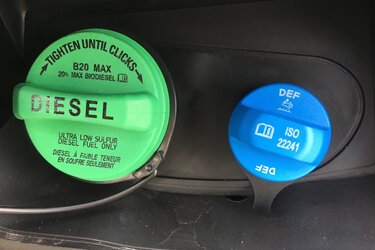
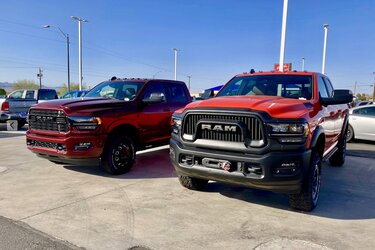
“If operators know how to care for them, diesels are still the way to go where mileage is high and heavy loads are frequently carried or pulled. Thus the heavier the truck, the more likely it is to get a diesel, the Big Three execs say. And the fewer the miles and the lighter the loads, the better a gasoline engine becomes, especially if a truck’s engine is shut off much of the time. Fifteen or so years ago, the operating threshold for choosing a diesel was 30,000 miles a year. Above that, a diesel began earning its keep by cutting fuel and maintenance bills. Now that threshold might be 40,000 miles and maybe more. A buyer should do an analysis to see where the numbers fall in his or her operation. Simply balance diesel’s upfront premium against any fuel economy gain, then factor in the difference between the cost of gasoline and diesel. The dollars-and-cents answer should be clear.”
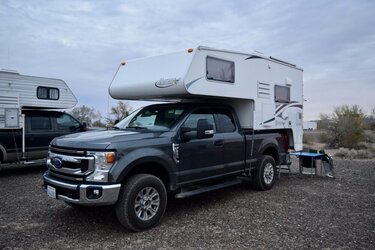 The author’s current setup using a 2020 F-350 with the Godzilla 7.3L V-8 Gasoline engine.
The author’s current setup using a 2020 F-350 with the Godzilla 7.3L V-8 Gasoline engine.

About Jefe4x4 7 Articles
When it comes to Extreme Truck Campers (XTC’s) and exploring off-road, few people know more than Jeff Reynolds. Known as Jefe 4×4 on the Internet forums, Jeff embarked on his first off-road adventure in 1965 and hasn’t looked back since. He’s owned over a dozen 4×4 vehicles of various makes and has traveled well over a million miles in them. In the 1990s he worked as a staff writer on the Jeep section of Off-Road.com then later wrote articles for 4x4Wire.com about the nuts-and-bolts of 4×4 drive-trains.
Gas vs Diesel: 23 Considerations Before Buying Another Truck
April 19, 2021
In 2017, we published our first article on this contentious topic called, “Gas vs Diesel for Truck Camper Rigs: Which is Better.” In that article we presented nine things to consider before buying a new truck. In this new article, Jeff Reynolds, ups to ante with a whopping 23 considerations. The results of his analysis, which was first presented at the recent Truck Camper Adventure Rally in Quartzsite, might surprise you.
The choice between either a gasoline or a diesel engine for a truck that carries a truck camper is a hot button issue. Young and old have dug in their heels to support their strongly held reasons for their choices. Engaging in research for this talk has been a real eye opener with a wide range of considerations, so I set about collecting as many worthy ones as I could find. If I offend anyone by leaving out their personal favorite truck it’s because I lack information. For that I apologize in advance.
I have always purchased horse power, torque, efficiency, longevity, brute strength, and low maintenance of the engine and drive train as the most important factors to do the job at hand using the engineer’s prime directive, “form follows function.” For use with a truck camper, I’ve come to believe a diesel engine was the ticket. But that belief over time has been shaken.
Over the past 20 years the 2001-2006 Dodge 5.9L 24-valve Cummins turbo diesel HO has proven to be one of the two undisputed winners in the early Diesel Wars. The other is the 1999 to early 2003 Ford 7.3L V-8 Power Stroke turbo diesel. My brother John has one. It is bulletproof. The technology of both of these is now getting long-in-the-tooth, but they’ll probably prattle on after many of us have taken our last off-ramp.
Engine Options for a Truck Camper
 Undisputed winners in the early diesel wars: the author’s old 2001 Ram 2500 with the Cummins 5.9L (third from left) and his brother’s 1999 Ford F-250 with the Power Stroke 7.3L (far right). The author’s current truck, a Ford F-350 with the 7.3L Godzilla V-8 gasser, is shown second from the left.
Undisputed winners in the early diesel wars: the author’s old 2001 Ram 2500 with the Cummins 5.9L (third from left) and his brother’s 1999 Ford F-250 with the Power Stroke 7.3L (far right). The author’s current truck, a Ford F-350 with the 7.3L Godzilla V-8 gasser, is shown second from the left.The start of the diesel wars around the year 2000 saw the emergence of a seemingly insatiable appetite by the truck-buying public for more power and more torque…. whether they needed it or not. It is addictive behavior. Once you drive a newer diesel it isn’t difficult to be seduced by the unimaginable power. You are not a “real man” unless you drive a diesel.
Thus began the diesel engine’s road to perdition. Unfortunately, the EPA and CARB had other ideas about internal combustion engines and thus began the slow inexorable tightening of the pollution control noose on diesel engines in order to cancel soot. To counter this trend, Ford and other car makers decided to develop add-ons and inject other potions to the engines to clear the air. While they did pass muster, the add-ons have proven not to have the life expectancy, low maintenance costs, and endurance of the legendary 5.9L Cummins or the equally legendary 7.3L Ford Power Stroke turbo diesel. But they do have impressively way more torque and horsepower.
Slightly later, GM unveiled their 6.5L Duramax turbo diesel V-8 mated to a sturdy Allison transmission, which put them at the front for a time, grabbing the baton in the changing fortunes of one-upsmanship during the diesel wars.
The final year that diesel truck engines were sold without major air pollution reducing add-ons was sometime during 2006 and 2007.
Early on, transmissions were the woe, with all that newly developed diesel engine torque raging war on transmissions simply too weak to withstand the torque load or have any longevity, especially with Fiat-Chrysler transmissions. Meanwhile, V-8 and V-10 gasoline engines were still in the running as a somewhat meager alternative to the massive torque of the diesels, but with considerably less torque and mileage. The gassers still had a large following for occasionally hauling a not-so-large or heavy truck camper.
I made a numbers comparison chart of the largest 2020 gas V-8’s and diesel engines of all three major truck manufacturers and believe I have stumbled onto one reason that gas V-8’s don’t stand up to heavy hauling. It’s the drop in torque that the smaller gas V-8’s exhibit. Only the Ford 7.3L and GM 6.6L gassers retain most of their torque down to the 1,500 rpm range. The published numbers are difficult to pin down as there are discrepancies in the literature of the “Big Three.” The difference may be due to different applications and air pollution rules.
 The Ford Godzilla 7.3L Gasoline V-8
The Ford Godzilla 7.3L Gasoline V-8- 2020 GM 6.6L gas V-8 engine with direct injection, rated 401 horsepower at 5,200 rpm rated 464 pound-feet torque at 4,000 rpm falling to 345 pound-feet at 1,600 rpm.
- 2020 GM 6.6L Duramax turbo diesel L5P engine, rated 445 horsepower at 2,800 rpm and dropping going up in rpm, rated 910 pound-feet torque at 1,600 rpm. and dropping going up in rpm.
- 2020 RAM Hemi 6.4L gas truck engine, rated 410 horsepower at 5,600 rpm, rated 429 pound-feet torque at 4,000 rpm dropping like a rock to 100 pound-feet at 1,600 rpm.
- 2020 RAM Cummins 6.7L HO turbo diesel I6 engine, rated 400 horsepower at 2,800 rpm, rated 1,000 pound-feet torque at 1,800 rpm.
- 2001 Cummins 5.9L HO turbo diesel engine, rated 245 horsepower at 2,400 rpm, rated 505 pound-feet torque at 1,600 rpm with torque all the way down to idle.
- 1999 Ford 7.3L Power Stroke turbo diesel, rated 235 horsepower at 2,700 rpm, rated 500 pound-feet torque at 1,600 rpm.
- 2020 Ford Godzilla 7.3L gas V8 rated 430 horsepower at 5,500 rpm rated 475 pound-feet torque at 4,000 rpm, dropping to 405 pound-feet at 1,500 rpm. The torque curve drops less than the others at 1,500 rpm.
- 2020 Ford 6.2L gas V8 rated 385 horsepower at 5,750 rpm, rated 430 pound-feet torque at 3,800 rpm dropping to 200 pound-feet at 1,500 rpm.
- 2020 Ford Scorpion 6.7L turbo diesel rated 475 horsepower at 2,800 rpm rated 1,050 pound-feet torque at 1,600 rpm.
Ford’s 7.3L and GM’s 6.6L gas engines have an extra arrow in their quiver, namely a brand new 10-speed automatic transmission. Besides the lowest of low gears at 4.6 or 4.7 they have a perfect spread of gears right up to the three overdrive gears.The combination is simply a game changer. It puts a massive amount of torque to the drive wheels; just what you need when hauling or pulling a big load like a truck camper. Ford is so sure of this engine and transmission that they use it in applications up to F-750 trucks with up to a 37,000 pound GCVWR. Impressive.
 Bundutec Roadrunner with the Ford Tremor 7.3L Gasoline V-8. (Paul McPhillips)
Bundutec Roadrunner with the Ford Tremor 7.3L Gasoline V-8. (Paul McPhillips) The new Nimbl Vehicle Evolution is powered by Ford’s new 7.3L gasoline V-8.
The new Nimbl Vehicle Evolution is powered by Ford’s new 7.3L gasoline V-8.GM has upped the ante also with their own 10-speed automatic especially designed for use in trucks. The GM numbers look to be largely rounded off Ford numbers. I suspect they use the same or similar internals with each using their own case mold to fit GM or Ford protocols and bell housings. Here’s a comparison between the two:
- GM 10L90: first gear 4.70; second 2.99; third 2.15; fourth 1.80; fifth 1.52; sixth 1.28; seventh 1.00; eighth 0.85; ninth 0.69; tenth 0.64; reverse 4.87.
- Ford 10R140: first gear 4.615; second 2.919; third 2.132; fourth 1.773; fifth 1.519; sixth 1.277; seventh 1.01; eighth 0.85; ninth 0.687; tenth 0.632; reverse 4.695.
Enter the newest addition to my two truck fleet: a 2020 Ford 4WD, F-350 SRW super cab, short-bed with the 7.3L gas V-8 and new 10-speed automatic.
My first instinct in looking around for another truck was to buy another diesel pickup. But the more I looked at the clabbed-on air pollution control devices on newer diesels, and the more I read about the owner complaints about newer diesels, the more I looked for other options. What complaints? Below is a compendium of Ford diesel fuel emissions systems woes reported by owners on the Ford Truck Enthusiasts (FTE) Forum website. Many of these same woes also pertain to owners of newer GM and Fiat-Chrysler diesel trucks.

- OCC output circuit check
- DPF diesel particulate filter
- SCR selective catalyst reduction
- DEF diesel exhaust fluid
- DEF tank and pump
- BOSCH CP4.2 injector pump aka HPFP high pressure fuel pump VCV volume control valve on the CP4.2
- EGR exhaust gas recirculation
- Limp Mode
- Active and Passive Regen: A forced regen occurs when soot builds up inside the diesel particulate filter (DPF) to the point that the vehicle is no longer operable. When this happens, a driver has to pull over and initiate a self-cleaning process that can take up to 40 minutes—valuable time that could have been spent on the road.
- WIF water in fuel
- ECS emission control system
- Additives
- Maintenance
Gas vs Diesel: 23 Considerations Before Buying Another Truck

- Fuel Cost: At one time diesel fuel, being on a lower rung of the distillate scale (cetane), was cheaper than gasoline, which was higher on the distillate scale (octane). In 1965 my wife and I visited Baja California in our Jeep. In Ensenada, the price of Pemex diesel fuel had just doubled from $.08 to $.16. Of course it was bilge tar ultra high sulfur diesel fuel. Pemex Nova gasoline was around $.20 per gallon. But that’s ancient history. Stateside the price of diesel fuel is now higher than gasoline, sometimes by a lot depending on your location. In California a gallon of regular gas is $.40 to $1.00 lower than a gallon of diesel fuel. The following comparo is of a trip we made from our home on the Sierra Nevada’s west slope to Carson City, Nevada. The price of diesel fuel in California at that time was $3.75 per gallon. In the hour and a half it took to drive to Carson City we stopped and topped off at $1.99 per gallon. Nice!
- Fuel Availability: Depending again on your location, availability could be a concern with gasoline being more available. The difference in availability whether in the city or in a remote environment could be important.
- Fuel Tank Size: Some are worried about the tank size for gas engines being too small since they consume more fuel. But that gap is narrowing and aftermarket fuel tank makers are taking note.
- Running Out of Fuel: You don’t ever want to run out of fuel with a diesel truck. Because of a faulty fuel gauge, we ran out of fuel on I-5 going uphill in a shoulderless section in Washington state with our 5.9L Cummins. The infamous “dead pedal” paid us a visit. I thought the mpg was too good to be true at the time. We had to be towed off the freeway to the nearest dealer that could service and prime the fuel pump. It took a half-day to get the fuel system back in order, and our early diesel engine is a lot simpler than the current crop of diesels. A gas engine will start right up after putting a little gas in the tank.
- Diesel Penalty at Purchase: This can add as much or more than $10,000 to the initial cost of a new diesel truck. Doing the math on those who have studied the diesel penalty and how many miles it would take to recoup the penalty, I come up with an average of 250,000 miles to break even. Some report higher numbers; some report lower, depending on the taxes and cost of fuel in their area.
- Gas Penalty at Purchase: Our Ford F-350 had a penalty of $1,705 for the 7.3L gas engine, but they throw in the 10-speed automatic for free. The Ford 6.2L gas V-8 has no penalty.
- Your Age: If you’re older with less time to drive 250,000 miles to cover the diesel penalty surcharge, a gasser could make sense. I don’t have enough time left to drive it 250,000 miles and pay off the diesel penalty, so the gasser makes a lot of sense.
- Length of Time You’ll Own the Truck: Most of us have no crystal ball, but have a pretty good grasp of how long we will “think” we will own a truck and camper and be able to negotiate both stairs and big steps up to the bed. If you’re short-timers like us, a gas engine could be the ticket.
- State Taxes: Every state has a different view on petroleum products taxation. Progressive states, like California, are trying to phase out internal combustion engines by raising taxes high enough that your attitude about ownership will change.
- Power and Torque: The diesel, warts and all, has the advantage here, hands down. In my survey of owners, the dividing line between success with a diesel or gas engine gravitates to the number 15,000. A GVWR of 15,000 pounds with a truck camper means a three series dually gas or diesel truck. Towing a trailer or fifth wheel that weighs over 15,000 pounds the diesel is king. Below 15,000 pounds, a gas engine, like the 7.3L Ford, GM 6.6L gas, 6.2L Ford, or Fiat/Chrysler 6.4L Hemi to a lesser extent, will handle whatever you’ve got. Any of the above in the F-350/3500 single rear wheel format will handle your camper that weighs less than 4,000 pound loaded up and wet. With a dually, the number can rise to a 5,000-pound camper loaded and wet depending on the GVWR. That’s two people, full fuel, water, and propane—all your stuff. The bottom line is that a Ford 7.3L V-8 now in DRW F-450’s and F-550’s will carry and move any size camper you have.
- Miles Per Gallon: Early diesels had a clear advantage on mpg compared to big block gas engines. But with all the air pollution controls on modern diesels, and the improving gas engines, especially the Ford 7.3L, the gap is closing. The difference in mpg between my 2001 Dodge Cummins and our new Ford F-350 7.3L is a solid 1-mpg hauling exactly the same camper at the same speed with the same weather conditions over the same real estate. So the mpg advantage had with earlier diesels is evaporating. It’s my personal experience and the experience from other Ford 7.3L gasser owners is that the 7.3L will not get the big mpg drop carrying or pulling a heavy load like the smaller V-8’s do. This is a big deal.
- Miles Traveled: Another issue is how much you use the truck and camper. If you put few miles on it, or seldom use it, the gasser makes even more sense.
- Weight of Engines: A diesel engine puts between 600 and 650 pounds more weight on the front axle making it more front heavy and harder to steer. The engine you chose has an effect on payload. A gas engine is easier to steer, all things being equal, and can have a higher payload rating by at least that 600 to 650-pound margin.
- Maintenance Additives: At one time a diesel, like my 2001 Cummins, had a simple and low maintenance profile, with no spark plugs and a 7,500 mile oil change interval. Yes, it’s 12 quarts of oil, and a couple filters, but very little else to service. Those times have changed enough that many newer Ford 6.7 diesel owners will sell their trucks before the warranty runs out. Servicing them can be very costly especially if you are negligent. My brother Jim made the ultimate mistake by putting regular gas into his 2016 Ford F-250 twin turbo diesel. He took it to a Ford dealer to have the system flushed. The quote was $20,000! It’s a cab off operation! He found a big trucking outfit, Myers Diesel in Bakersfield, California to do the deed for $2,000. Diesel engines need special fluids and potions to keep them happy, of which every owner must be mindful. Modern V-8 gas engines on the other hand have a low maintenance profile.
- Reliability: Some of you with newer diesels may have been stuck on the side of the road with a regen or a lack of Diesel Exhaust Fluid in its separate tank. A gasser will not face those problems. However, the Ford 7.3L and GM 6.6L gassers have a very short track record from which to judge reliability. The best way to judge reliability before you buy is to get on that brands’ user website.
- Longevity: Diesel engines are built to last a long time and can withstand the constant beating of high compression. Gas engines are lasting longer than ever. The Ford 7.3L and GM 6.6L V-8’s now also have very robust parts.
- Load Size and Weight of Your Camper: If your camper weighs more than 4,500 pounds wet and fully loaded, a diesel engine could be the one. Below about 4,000 pounds wet, a Ford 7.3L , 6.2L, or GM 6.6L gas single rear wheel F-350 or 3500 will offer plenty of capacity, performance, if not as good mpg. Many on the FTE forum are happy to use their new 7.3L gas V-8 SRW F-350 with over 22,000 pounds of CGVWR. Our F-350 gas 7.3L trailer tow/5-er rating is 20,000 pounds, with a CGVWR of 28,000 pounds.
- Speed: How fast do you drive on the freeway/turnpike? The problem with a hard-side truck camper is not as much the weight but wind resistance. The slower you drive the lower the wind resistance. If you drive fast, a diesel could be in your garage. If you just bumble along at 60 to 65 mph, a gas engine could make more sense.
- Terrain: If you live and drive at high elevations, or do most of your driving in mountainous areas, the nod is toward the turbo diesel. Turbo diesels have no appreciable fade at elevation. The turbo keeps cramming air into the cylinders regardless of whether the air is heavy or thin. I’ve hauled my old Lance camper on a Cummins 5.9L easily at elevations over 13,000 feet. A gas engine fades as it climbs into higher altitudes.
- Breakdown: If you breakdown, it’s easier to find a mechanic that can work on a gas engine than a diesel engine.
- Short Trips: A diesel engine takes a while to warm up that heavy block and three gallons of oil to operating temperature. Also, stop and go driving is detrimental to a diesel engine. If you drive in short trips, consider a gas engine. It warms up faster.
- Long Trips and High Miles: Last fall we made a 2,200 mile sojourn to Yellowstone, the Grand Tetons, the Black Hills, Devil’s Tower, Mount Rushmore, and environs with our aging 2001 Dodge Cummins 5.9L and new Northstar Laredo. The engine thrives on being used. It actually ran better and better during the trip. Much of the time our Dodge sits around under a shade tree just waiting for another chance to shine.
- Resale Value: This is the great redeeming point for diesel owners who report getting back a large chunk of their value at resale. But the times are a-changing and I believe one of the new, deep torque, gas V-8’s will retain much of their original value, if you can find one. Most of the people on FTE’s site who have gone from a lifetime of diesels to the 7.3L Godzilla V-8 have done so because of the high diesel fuel and maintenance costs, don’t need all that diesel power, and are getting older and scaling down the size of their rig.
“If operators know how to care for them, diesels are still the way to go where mileage is high and heavy loads are frequently carried or pulled. Thus the heavier the truck, the more likely it is to get a diesel, the Big Three execs say. And the fewer the miles and the lighter the loads, the better a gasoline engine becomes, especially if a truck’s engine is shut off much of the time. Fifteen or so years ago, the operating threshold for choosing a diesel was 30,000 miles a year. Above that, a diesel began earning its keep by cutting fuel and maintenance bills. Now that threshold might be 40,000 miles and maybe more. A buyer should do an analysis to see where the numbers fall in his or her operation. Simply balance diesel’s upfront premium against any fuel economy gain, then factor in the difference between the cost of gasoline and diesel. The dollars-and-cents answer should be clear.”
 The author’s current setup using a 2020 F-350 with the Godzilla 7.3L V-8 Gasoline engine.
The author’s current setup using a 2020 F-350 with the Godzilla 7.3L V-8 Gasoline engine.
Like this:
Loading...- 6.6L DURAMAX DIESEL
- CHEVY
- CUMMINS 5.9L DIESEL
- CUMMINS 6.7L I6 TURBO DIESEL
- DIESEL
- DODGE
- FORD
- FORD 6.2L GAS V8
- FORD 7.3L PSD
- FORD GODZILLA 7.3L GAS V8
- GASOLINE ENGINES
- RAM
About Jefe4x4 7 Articles
When it comes to Extreme Truck Campers (XTC’s) and exploring off-road, few people know more than Jeff Reynolds. Known as Jefe 4×4 on the Internet forums, Jeff embarked on his first off-road adventure in 1965 and hasn’t looked back since. He’s owned over a dozen 4×4 vehicles of various makes and has traveled well over a million miles in them. In the 1990s he worked as a staff writer on the Jeep section of Off-Road.com then later wrote articles for 4x4Wire.com about the nuts-and-bolts of 4×4 drive-trains.


